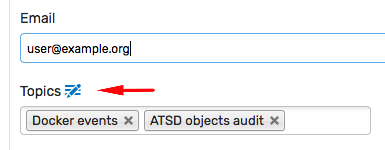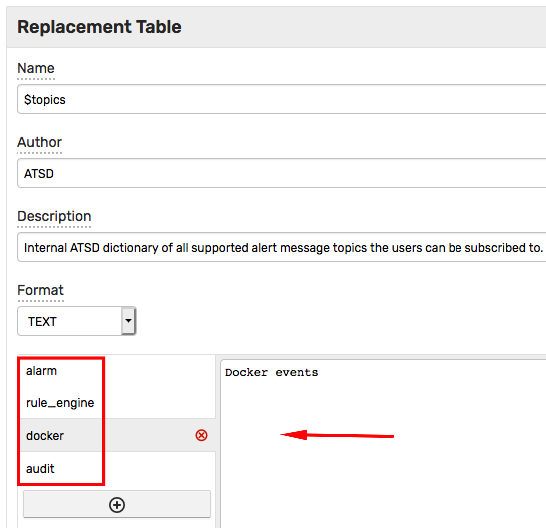Lookup Functions
Overview
These functions retrieve collections and maps of strings from named collections, replacement tables, and other database tables.
Replacement tables are listed on the Data > Replacement Tables page.
Named collections are listed on the Data > Named Collections page.
Reference
collectionlookuplookup_rowreplacementTableentity_tagentity_tagsentity_labelgetEntitygetEntitiesgetEntityCountgetEntityNameget_group_emailssubscribers
collection
collection(string name) [string]
Retrieves a list of strings for the specified collection identified by name. Named collections are listed on the Data > Named Collections page.
If no collection is found, the function returns an empty list.
tags.location NOT IN collection('dc-locations')
collection('dc-locations').contains(tags.location)
To check the size of the list, use the .size() method.
To access the n-th element in the collection, use square brackets [index] or the get(index) method (starting with 0 for the first element).
author = (authors.size() == 0) ? 'n/a' : authors[0]
lookup
lookup(string name, string key[, bool def]) string
Returns the value for key key from the replacement table identified by name.
The function returns an empty string if the table is not found or if the table does not contain the specified key.
If the optional boolean def parameter is specified and is set to true, the function returns the original argument key in case the table is not found or if the key is not found.
Example:
/* Returns 'john.doe' if the 'on-call' table does not contain an entry for 'john.doe' */
lookup('on-call', 'john.doe', true)
lookup_row
lookup_row(string name, string key) map
Retrieves the row object from the replacement table identified by name for the specified key.
The replacement table must be of CSV type. The first column is designated as the primary key and the key match is case-sensitive.

The function throws an error if the replacement table is not found and returns an empty map if the key is not found.
The response object contains fields that correspond to the columns in the replacement table. The first primary key column is not included in the response object.

replacementTable
replacementTable(string name) map
Retrieves the replacement table identified by name as a key-value map.
If the table is not found, the function returns an empty map.
// .keySet() returns a collection of keys in the replacement table
replacementTable('oncall-emails').keySet()
// .values() returns a collection of values in the replacement table
replacementTable('oncall-emails').values()
// returns a random value in the replacement table
randomItem(replacementTable('oncall-emails').values())
// returns a random key-value object from the replacement table
randomItem(replacementTable('oncall-emails'))
entity_tag
entity_tag(string entity, string name) string
Returns value of tag name for entity entity.
If the tag or the entity is not found, an empty string is returned.
entity_tags
entity_tags(string entity [, bool format]) map
Returns entity tags for entity entity as a map.
If the entity is not found, the function returns an empty map.
If the optional format argument format is set to true, the tag names in the map are converted to labels using the applicable entity tag templates which are listed on the Settings > Tag Templates page.
To exclude specific tags from the results, use the excludeKeys() function:
excludeKeys(entity_tags(ent), ['image', 'java.home'])
Example:
entity_tags('08ac68c080bc2829f9c924949c86f65d2140c3f1253f3510f8a4e2e4d5219e2b')
+-------------------------+----------------------------------------------+
| Name | Value |
+-------------------------+----------------------------------------------+
| hostname | 08ac68c080bc |
| image-name | jmeter |
| image-repotags | axibase/jmeter:latest |
| image-tags | latest |
| ip-address | 172.17.0.18 |
...
entity_tags('08ac68c080bc2829f9c924949c86f65d2140c3f1253f3510f8a4e2e4d5219e2b', true)
+-------------------------+----------------------------------------------+
| Name | Value |
+-------------------------+----------------------------------------------+
| IP Address | 172.17.0.18 |
| Hostname | 08ac68c080bc |
| Image Name | jmeter |
| Image Tags | latest |
| Image Repo Tags | axibase/jmeter:latest |
...
entity_label
entity_label(string entity) string
Returns label for entity entity.
If the entity is not found or the entity does not have a label, the argument entity is returned.
getEntity
getEntity(string entity [,bool matchLabel]) Entity
Retrieves an entity object by name. If matchLabel set to true entity is searched by label if entity is not found by name. By default matchLabel is false.
Access Entity object fields using dot notation, for example getEntity('nurswgvml007').label.
The function returns null if the entity is not found.
Example:
/* Returns an interpolation mode of 'nurswgvml007' entity object */
getEntity('nurswgvml007').interpolate
getEntities
getEntities(string metric, string startDate, string endDate, string expr) [Entity]
Returns a list of Entity objects with last insert date for metric metric between startDate and endDate and matching the specified expression expr.
Expression expr can include entity fields (except lastInsertDate) and window fields. Refer to entity fields using dot notation.
Start date startDate and end date endDate are ISO format dates or a calendar keyword.
To access the n-th object in the list, use square brackets [index] or get(index) method, starting with 0 for the first element.
Examples:
entities = getEntities('docker.activecontainers', 'now - 1 * HOUR', 'now', "tags.status != 'deleted'")
// entities[0].name
// date_format(entities.get(0).lastInsertTime, "yyyy-MM-dd HH:mm:ss", "UTC")
- Match using entity object field
getEntities('df.inodes.used', '2018-01-13T18:08:04Z', '2018-02-13T18:08:04Z', "enabled=true")
- Match using wildcard
getEntities('jvm_memory_used', 'now - 4*YEAR', 'now', "tags.alias LIKE '00*'")
- Match using window field
getEntities('cpu_busy', 'yesterday', 'now', "interpolate = 'LINEAR' && tags.app = '" + entity.tags.app + "'")
getEntityCount
getEntityCount(string metric, string startDate, string endDate, string expr) int
Returns a count of Entity objects with last insert date for metric metric between startDate and endDate and matching the specified expression expr.
Identical to getEntity(metric, startDate, endDate, expr).size().
getEntityName
getEntityName(string entity) string
Returns normalized (lowercase) entity name for input string entity. The function searches for entity by name entity in a case-insensitive manner. If the entity is not found by name, the function attempts to find an entity by label entity in a case-insensitive manner.
If the entity cannot be found, the function returns the original entity argument.
get_group_emails
get_group_emails(string user_group) list
Returns the list of email addresses of active (non-locked) members of the specified user group.
${get_group_emails('Dev Ops')}
subscribers
subscribers(string topic_name_1 [, string topic_name_2]) list
Returns the list of email addresses for users who have subscribed to the specified topic on their personal user account pages.

${subscribers('docker', 'audit')}
The list of topics is managed by an administrator as a replacement table at https://atsd:8443/replacement-tables/%24topics.

